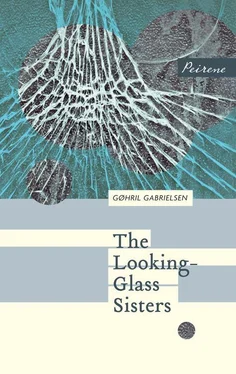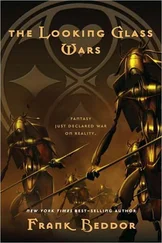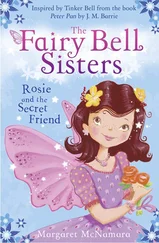My incoherent babbling stops. I am shocked, me too; quite simply, I cannot think of anything that will explain the pitch-black contents of the glass. A wave of panic rises in my throat. I realize that I am hoist by my own petard, that my future hangs on an impossible choice between two explanations: burning the application or casting a spell on Johan.
I try to move so I can breathe, catch Ragna’s gaze, but her hands respond by twisting my collar even tighter. My mouth feels dry, useless; I can’t get any air past my lips, any word out of my mouth. I want to swallow, but can hardly move my throat. The only thing I do is think, while my breath bursts and bangs in my throat, Poor, poor Ragna, I have never seen you so furious before in my life .
Three hundred and sixty-five million years ago, at some point during the late Devonian and early Carboniferous periods, 70 per cent of all life was annihilated. A hundred and fifteen million years later, during the transition between the Permian and the Triassic, the same thing happened again, but this time 96 per cent of life in the sea and 70 per cent of life on land died.
After a seething, breathing, surging, pounding life of reptiles, amphibians, plants, insects, invertebrates, practically everything disappeared in an instant, or perhaps slowly, over time — but a time that we can’t count, a time that does not exist, a time that relentlessly closes around skin and shell, bone and cartilage. Leftovers that also gradually crumble, disintegrate, are gone, for even the decomposition ceases, after a time there is hardly anything left to decompose — not a morsel, a stub, a scrap, not even a sweeping of what was once a great diversity of existence, can be detected in the ocean or on the surface of the earth. Even the dust of what once lived is gone. Everything has collapsed into a slough of oblivion, layer upon layer beneath crusts and in hidden cavities. Disappeared into an infinity of stillness that, using the human numerical system and human concepts, spans a period of several hundred million years.
That is how it continues, unceasingly.
Life comes into being. After one mass extermination then another, after life has emerged and disappeared, reemerged and disappeared once more, after death upon death upon death in an infinity of time, you arrive at the form of a human being — a species among many other species — developed in the course of a few hectic thousand years. Your limbs are long, wobbly and thin, flesh-pink, and you have no shell, bristles or feathers. You belong to a species that walks on two legs, is carnivorous and equipped with a cunning intelligence that, among other things, manifests itself in a desire for dominion over other animals and nature. And you are aware of your own finiteness, the definitive, the ineluctable.
That is the certainty into which you are created and by which you are created.
The activity of the earth is death. The smell of the earth is death.
You turn your face away. Close your eyes, hold your nose. The putrefaction, the disgusting, nauseous filth of the earth, is something you can’t stand.
You want to live.
*
I don’t want to be gone. I don’t want to!
Hasn’t that always been my mantra? My obsession throughout my life?
Perhaps I managed to live on only air and thoughts. I’m still here, although somewhat reduced and in an unknown part of the house. I can’t recall, so to speak, whether we have an attic, a whole floor above the kitchen and our bedrooms. I can’t remember either a staircase or a door that leads up here, or ever hearing Ragna on the stairs, rummaging around in the crates and boxes, or being aware of steps above the ceiling when I lay in bed in my old room. Something must have happened since our last clash, Ragna’s rage must have completely taken over. She pushed me down on the bed, that much I remember, but not how I was brought here, transported up the narrow staircase. I don’t understand how they managed; I was probably unconscious. She must have hit me, and she must have hit me hard — large portions of my memory have been blanked out.
I want to go down again, to my room and bed and all my books. I want to go down and live to the rhythm of morning, afternoon and evening. Is it day or night? The day cycle has ended, summer is at its most intense, I can’t sleep and I’m not completely awake either. The sun, this burning light, everything has become so white — it must be due to the height, I have probably never been closer to the sky. I am constantly blinded, can hardly see, everything in this room has a reflection so penetratingly white that I have to screw up my eyes or keep them completely shut.
It tires me out so much. If only I had a pair of sunglasses.
‘Rgna!’
‘Rgna!’ I try again. ‘Iv gt t hve sm snglasss!’
The dryness in my mouth glues the words together until they’re almost unrecognizable. I haven’t drunk anything for several days. Or is it weeks? Under this burning sky, completely outside time, it could just as well be a question of months, if not years, orbiting in an insane thirst around the sun. Ragna must come immediately with thirst-quenching water — if not, it will be impossible to bring me back to life. For I am already a dried-out country lying here. I am earth so dry that I have cracks several metres down into the abyss. At the bottom, in the depths down there, I continue to trickle — a thin, seeping stream that slowly twists along its bed, waiting for rain, for floods, for the balm of Ragna’s care.
But time is short. Sand blows in across the plains, fills cavities, drifts into the cracks. Only the tongue and palate are still working in this godforsaken body, and they are both in the process of swelling up into the sky.
‘Cm, Rgna! Hlp. M so thrsty!’
How can she suddenly avoid all contact, bound as she is by her obligation as a sister to take care of me? The sudden idleness after her lifelong, daily activity must, if nothing else, have given rise to a feeling of unrest, or gnawing thoughts about how I am getting on now. What does she do with her time? Does she feel a twinge in the morning around the time for my morning care? Does she wake up at night around the time I used to call out for help?
Johan has sabotaged our sisterly pact, he’s the one who’s lured her into thinking new thoughts, making choices that distance her from her true work. What does he really want, that greedy man-child? For her to wash and dry his bottom, the same as she did previously for me?
*
This room, it seems impossible to think that anyone can have lived here. The house was built before Ragna was born, but everything seems to be worn out and dilapidated. The paint on the floorboards has been worn away in a straight line from the bed to the door, probably by someone over a period of years. The curtains, faded and threadbare, flutter by the draughty window, while on the walls the sharp outlines of frames suggest that pictures once hung there. The chair, the bedside table and the chest of drawers wobble on unstable legs, the water has been turned off at the mains and the washstand is cracked. I can’t understand it; someone must have lived and worked in this room, but not Ragna or me, and it can’t have been Mum and Dad either.
There is no reason to doubt my location, where I actually find myself, for right beneath the window the old birch tree stands swaying. I could grasp the branches if I wanted to, and see, when I stretch towards the glass, how the rosebay willowherb grows in great clusters as before, and how the open plains stretch out in their familiar way for miles and miles around. Everything is as usual — both the view and the room, just dilapidated, and seen from high up. And that makes me feel really giddy.
Читать дальше











